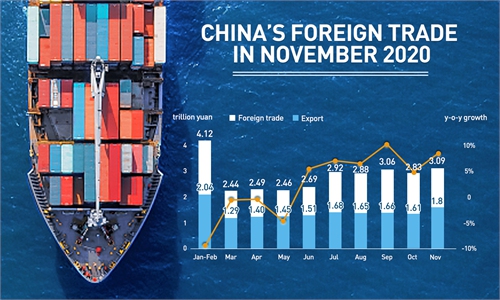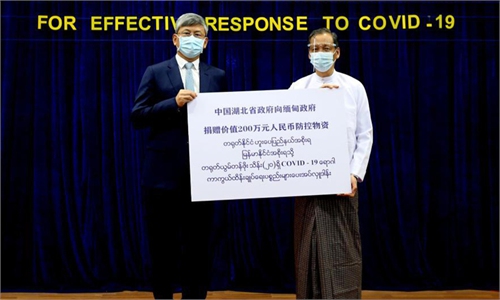Expectations rise for China-US health cooperation
Personal protective items, vaccine possible areas for shared efforts: experts

Pedestrian wearing face coverings walk in New York, the United States, Jan. 1, 2021. (Xinhua/Wang Ying)
Expectations are rising both in China and the US for potential cooperation on medical supplies in the fight against the COVID-19 pandemic, as the administration of US President Joe Biden has put fighting the virus front and center.
The 2021 annual letter themed 'the year global health went local'was released by Bill Gates and Melinda Gates on Wednesday, reviewing the epidemic in 2020 and addressing the future.
Speaking to 21st Century Business Herald in an online press conference on the day of the letter's release, Gates stressed that cooperation between China and the US is critical to combating the pandemic, including ending the current pandemic and preventing the next one, while he pointed to China's continuing technological advances, improving regulatory capabilities and a growing willingness to help the world.
As far as China-US relations are concerned, Gates hopes that even though the two countries have differences, there are some areas where both can cooperate to help the world, because both of these two major countries have great strength, the report said.
Biden has not come to a conclusion on the relationship with China, is still studying it, so the major probability is that he will increase cooperation with China, He Weiwen, a former senior trade official and an executive council member of the China Society for World Trade Organization Studies, told the Global Times on Wednesday.
Going into the details of potential cooperation, Zheng Zhihua, a representative of the American General Business Association in Beijing, told the Global Times on Tuesday that the Biden administration would greatly expand the imports of Chinese medical protective items to an extent that is greater than last year during Trump's administration, given that the first priority for Biden is to get the pandemic under effective control.
Reported infections in the US surpassed 25.44 million as of Wednesday, with the death toll exceeding 425,000, according to data from Johns Hopkins University.
As a part of the greater effort to control the epidemic, more companies could get FDA certifications, Zheng said.
Roberta Lipson, founder of United Family Healthcare, agreed that there is plenty of room for cooperation between China and the US, first and foremost in healthcare amid the epidemic's hardships.
"The entire world is hurting now, and bringing the pandemic under control will take a certain amount of global coordination, which could and should start with the US and China," said Lipson.
After many years of progress in the US-China relationship, which benefited the peoples of both countries, the relationship suffered serious setbacks over the past few years.
As the Biden administration restores the US commitment to the World Health Organization, there will be many opportunities to reinvigorate the relationship in the field of healthcare on many levels, Lipson said.
"Public health officials must reengage to make sure both countries are sharing knowledge and best practices of epidemic prevention," Lipson said, noting that there is much that the world can learn from China's systems for controlling the COVID-19 pandemic.
"Many important areas of collaboration have been curtailed, delayed or canceled, including those in the sphere of public health. As the new administration takes over, one of the easiest and most meaningful areas to reenergize would be dialogue in the area of healthcare," said Lipson.
Lipson said that cooperation in areas including vaccine development and distribution, as well as essential medical devices and medicines and their supply chains, could help to control the current pandemic and prevent the next one.
Underscoring the US' need for health-related supplies, starting last August, the US side quietly eased tariffs on Chinese medical supplies that had been imposed during the trade war between the US and China, Gao Lingyun, an expert at the Chinese Academy of Social Sciences in Beijing, told the Global Times on Wednesday.
"After the partial elimination of this part of the tariffs, the remaining tariffs on Chinese medical supplies are almost negligible," said Gao.
High tariffs make the use of imported products more costly for both countries, said Lipson, adding that elimination or reduction of these duties would give patients in both countries access to the most suitable products at reduced costs.
Further, there could be more positive trends on both sides when it comes to cooperation on the research and production of vaccines and medicines for COVID-19, noted Gao.
Lipson said that there is much work to be done to improve the possibilities for closer collaboration in healthcare, health education, and medical research, which includes clarifying issues in the genetic material management law, the cybersecurity law and the healthcare investment laws.
"Opening the market for leading-edge therapies and medicines will also benefit from level playing fields in central procurement as well as reliable intellectual property rights protection," said Lipson.



